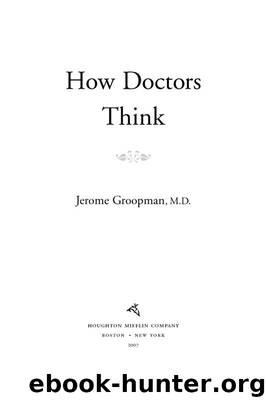How Doctors Think by Jerome Groopman

Author:Jerome Groopman [M.D., Jerome Groopman]
Language: eng
Format: epub, mobi
Publisher: Houghton Mifflin Harcourt
Physicians, like everyone else, display certain psychological characteristics when they act in the face of uncertainty. There is the overconfident mind-set: people convince themselves they are right because they usually are. Also, they tend to focus on positive data rather than negative data. Positive data are emotionally more appealing, because they suggest a successful outcome: apparently normal oxygen levels or higher pressures in the left atrium mean surgery will succeed. Lock's errors pivoted on the power of positive numbers: the near-normal amounts of oxygen in the blood, the high pressure in the left atrium. Each of these positive numbers seemed to predict a good outcome. Such data have a powerful effect on our psyche, particularly in settings of uncertainty; they appear to be safe harbors in a storm, places to firmly dock our minds and point us to the next leg of our journey. But biology, particularly human biology, is inherently variable. Those variations, at times very small and easily ignored, can prove important. They reflect significant differences that our most refined measurements fail to capture. Lock is also concerned that many physicians assume all numbers have equal certitude or validity. "People don't throw in specific gravity," Lock said, meaning that not all results should be given equal weight in making decisions. You learn which numbers to respect and which to discount.
Specialists in particular are known to demonstrate unwarranted clinical certainty. They have trained for so long that they begin too easily to rely on their vast knowledge and overlook the variability in human biology. This is why Lock's epistemological focus is so important. He is constantly trawling his mind, reminding himself that the situation is uncertain and acknowledging that necessary actions and decisions made with the best intentions may not apply to every patient.
It is very difficult to do what Lock does: always to reflect rather than tacitly act on scant precedent. In their book Professional Judgment: A Reader in Clinical Decision Making, Jack Dowie and Arthur Elstein assemble articles from experts with contrasting opinions about physician cognition and how to improve it. Many of the contributors are from the Bayesian school of decision making, invoking "expected utility theory." This theory holds that the utility of a certain outcome is multiplied by its probability, and it determines the expected utility in the face of uncertainty. The calculation, based on axioms, has the doctor choose the path with the highest number emerging from the formula. Of course, much of what doctors like Lock deal with is unique; there is no set of published studies from which decision-analysis researchers can derive a probability.
Some experts contend that it is not only a unique case that makes a Bayesian approach untenable in many clinical settings. Donald A. Schön at MIT has written extensively about how professionals think, and he differs sharply from the decision-analysis camp, which relies on applied mathematics to model diagnosis and treatment—mathematics originally used to optimize submarine searching and bomb tracking, and that has been fostered by the advent of computers.
Download
This site does not store any files on its server. We only index and link to content provided by other sites. Please contact the content providers to delete copyright contents if any and email us, we'll remove relevant links or contents immediately.
Periodization Training for Sports by Tudor Bompa(8273)
Why We Sleep: Unlocking the Power of Sleep and Dreams by Matthew Walker(6725)
Paper Towns by Green John(5191)
The Immortal Life of Henrietta Lacks by Rebecca Skloot(4588)
The Sports Rules Book by Human Kinetics(4388)
Dynamic Alignment Through Imagery by Eric Franklin(4217)
ACSM's Complete Guide to Fitness & Health by ACSM(4060)
Kaplan MCAT Organic Chemistry Review: Created for MCAT 2015 (Kaplan Test Prep) by Kaplan(4013)
Livewired by David Eagleman(3775)
Introduction to Kinesiology by Shirl J. Hoffman(3773)
The Death of the Heart by Elizabeth Bowen(3622)
The River of Consciousness by Oliver Sacks(3604)
Alchemy and Alchemists by C. J. S. Thompson(3522)
Bad Pharma by Ben Goldacre(3428)
Descartes' Error by Antonio Damasio(3279)
The Emperor of All Maladies: A Biography of Cancer by Siddhartha Mukherjee(3163)
The Gene: An Intimate History by Siddhartha Mukherjee(3098)
The Fate of Rome: Climate, Disease, and the End of an Empire (The Princeton History of the Ancient World) by Kyle Harper(3067)
Kaplan MCAT Behavioral Sciences Review: Created for MCAT 2015 (Kaplan Test Prep) by Kaplan(2986)
